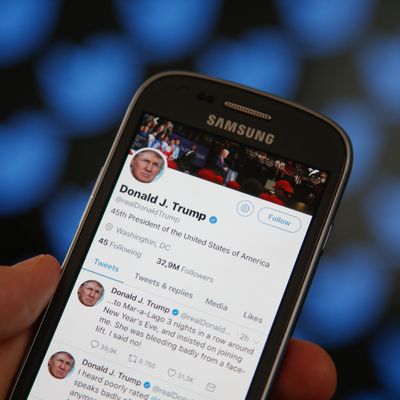
It can’t be good for anyone’s nerves to work at the State Department right now. From one day to the next, you can’t be sure whether your boss is about to get fired, whether your job still exists, or whether (as was the case on Wednesday) you’ll come into work to learn that the president wrote something on Twitter that would make people in other countries very angry at the United States.
The retweet heard round the world was of highly dubious videos circulated by the leader of the U.K.’s virulently Islamophobic Britain First party, purporting to show Muslims committing acts of violence. President Donald Trump’s decision to share a sloppy, racist propaganda message with his 44 million Twitter followers (and not for the first time) led to condemnations from British politicians and pundits of all stripes, with some calling for Trump to be banned from the U.K. — or, even more helpfully, from Twitter.
As a matter of basic decency and online etiquette, to say nothing of presidential leadership, it is generally unwise to endorse and distribute the recruiting material of foreign neo-Nazis, especially when Europe’s new, young, anti-immigrant right wing is making disconcerting gains. As a matter of U.S. foreign policy, it’s outright malpractice. Britain First is not a marginally mainstream party like Nigel Farage’s single-issue Brexit vehicle, the erstwhile U.K. Independence Party. Instead, it is what Alex Massie calls “a fringe organization even by the standards of fringe organizations”: An electorally irrelevant offshoot of the British National Party, Britain First exists mainly to threaten and terrorize British Muslims in the hopes of stoking the civilizational conflict they imagine is already ongoing.
In other words, the president of the United States just lent his imprimatur to a right-wing gang of fewer than 1,000 active members that the British government tends to view as criminals and troublemakers rather than a legitimate political movement. “Not content with poisoning American public life, Trump now coarsens Britain’s,” Massie sighs, though the forcefulness with which the British mainstream is rejecting the message is somewhat encouraging. In any case, the incident has soured our relationship with a key ally and will surely account for some new gray hairs in the Foreign Service.
What really caused the State Department to panic, however, was not the damage Trump was doing to our relationship with the U.K., but rather the potential for this gesture to be met with protests or violence at U.S. embassies, particularly in Muslim countries. “It didn’t manifest in anything actionable, but it was a big concern,” a State Department official told CNN. “We saw in Cairo and other places that simply posting something on the internet, even if nothing was intended by it, could have real consequences.”
Someone ought to tell that to the president.
In fairness, that was indeed the message the State Department was trying to communicate to the White House on Wednesday, but it has become abundantly clear by now that Trump is not heeding any advice to be more cautious in his tweeting. He has surely been told this before and has chosen to ignore it. Furthermore, this is not the first time his uncontrollable Twitter behavior has had consequences for U.S. foreign policy and it will not be the last.
Amplifying a right-wing fringe group in Britain is bad enough, but what happens when a tweet containing a threat is interpreted as a declaration of war, or leads to a misinterpretation of U.S. nuclear posture? These are real risks when the president has a giant, unfiltered, unchecked, unaccountable microphone to shout into whenever the spirit moves him. The calls from British MPs for Trump to either voluntarily give up his Twitter account or have it shut down are hardly outrageous.
In the first year of his administration, @realDonaldTrump has proven to be a foreign-policy wild card and a national security risk. The inability to control or account for the president’s Twitter behavior is one of many reasons why Rex Tillerson has failed as secretary of State — though his possible firing may be more of a punishment for trying to tame Trump than for failing.
If CIA director Mike Pompeo ends up rolling into Foggy Bottom as Tillerson’s successor thinking that he won’t run into the same Twitter problem just because Trump likes him more, he has a rude awakening ahead of him. Will Trump check with Pompeo before firing off cryptic, hostile tweets in the wee hours of the morning? Will he consent to having his tweets pre-cleared by advisers? As long as everyone in the government refuses to admit that Trump’s Twitter habit is the problem that it is, or to do anything about it, U.S. government policies and priorities will continue to be set, unpredictably, 140 to 280 characters at a time.





























